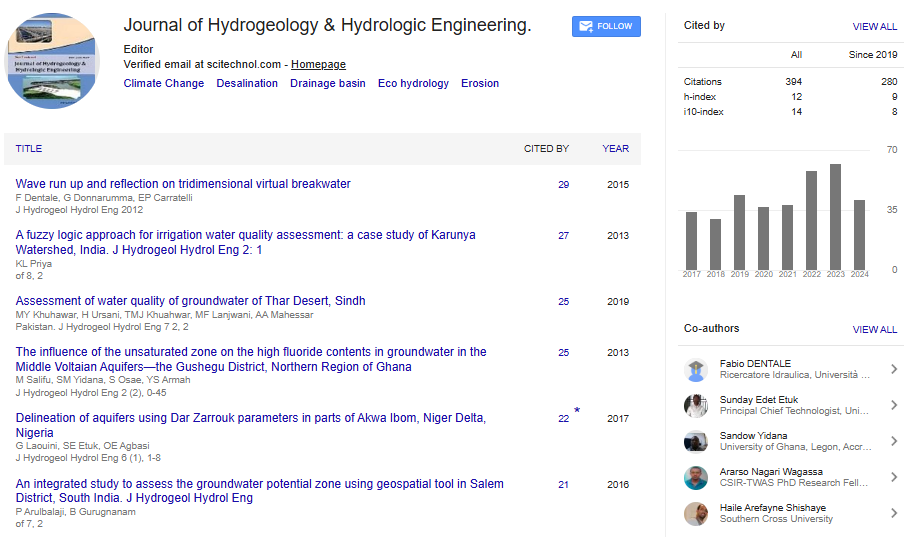Opinion Article, J Hydrogeol Hydrol Eng Vol: 12 Issue: 6
Unlocking the Vitality of Water Resources: A Comprehensive Exploration
Grey Nearing*
1Department of Geoscience, University of Calgary, Calgary, Canada
*Corresponding Author: Grey Nearing,
Department of Geoscience, University of
Calgary, Calgary, Canada
E-mail: nearings25@gmail.com
Received date: 20 November, 2023, Manuscript No. JHHE-23-123839;
Editor assigned date: 22 November, 2023, PreQC No. JHHE-23-123839 (PQ);
Reviewed date: 07 December, 2023, QC No. JHHE-23-123839;
Revised date: 15 December, 2023, Manuscript No. JHHE-23-123839 (R);
Published date: 22 December, 2023, DOI: 10.4172/2325-9647.1000299
Citation: Nearing G (2023) Unlocking the Vitality of Water Resources: A Comprehensive Exploration. J Hydrogeol Hydrol Eng 12:6.
Description
Water resources are the lifeblood of our planet, indispensable sources that sustain ecosystems, agriculture, industries, and human life itself. From majestic rivers and vast lakes to hidden aquifers and precious rainfall, these reservoirs provide a lifeline for countless organisms and serve as the cornerstone of human civilization.
The significance of water resources lies not only in their abundance but also in their multifaceted utility. They are integral to various sectors, playing a pivotal role in agriculture, industry, energy production, and maintaining ecological balance.
Agriculture stands as one of the foremost beneficiaries of water resources. Irrigation, drawing from rivers, lakes, and underground aquifers, facilitates crop growth and sustains vast agricultural landscapes. In regions where rainfall is scarce, the availability of water resources through irrigation systems ensures food security and supports livelihoods.
Beyond agriculture, water resources power industries across the globe. Manufacturing processes, from textiles to electronics, heavily rely on water for production and cooling purposes. Moreover, hydropower, a renewable and clean energy source, harnesses the kinetic energy of flowing water to generate electricity, contributing significantly to the global energy mix.
However, the sustainability of water resources faces formidable challenges in the contemporary world. Population growth, rapid urbanization, climate change, and inefficient water management practices strain these invaluable sources. Many regions grapple with water scarcity, intensified by over-extraction, pollution, and climate variability, endangering ecosystems and human well-being.
Efforts to manage and conserve water resources have become increasingly essential. Sustainable water management practices aim to balance the demands of various sectors while ensuring the long-term viability of these resources. Implementing efficient irrigation techniques, promoting water recycling and reuse, and adopting technologies for water conservation constitute vital steps toward safeguarding these invaluable sources.
Furthermore, preserving the quality of water resources is imperative. Pollution from industrial discharge, agricultural runoff, and inadequate waste management poses a significant threat. Contaminated water not only endangers aquatic life but also jeopardizes human health, making water treatment and pollution prevention pivotal in preserving the integrity of these resources.
In addition to human use, safeguarding water resources is fundamental to maintaining ecological balance. Aquatic ecosystems rely on these sources for habitat, sustenance, and reproduction. Healthy rivers and lakes support diverse flora and fauna, contributing to biodiversity and overall ecosystem resilience.
International cooperation plays an essential role in addressing water resource challenges, especially concerning Transboundary Rivers and shared aquifers. Collaborative efforts among nations foster equitable distribution, sustainable management, and conflict resolution regarding these resources, ensuring that access to water remains a fundamental human right.
Education and awareness initiatives also play a pivotal role in instigating change. By educating communities about the importance of water conservation, efficient usage, and the impact of their actions on water resources, individuals can contribute significantly to preserving these invaluable sources for future generations.
Conclusion
Water resources serve as the cornerstone of life, supporting ecosystems, agriculture, industries, and human well-being. Their sustainable management and conservation are imperative in addressing the challenges posed by water scarcity, pollution, and climate change. By fostering responsible stewardship and collective action, we can ensure the vitality and availability of these invaluable sources for generations to come.
 Spanish
Spanish  Chinese
Chinese  Russian
Russian  German
German  French
French  Japanese
Japanese  Portuguese
Portuguese  Hindi
Hindi 
